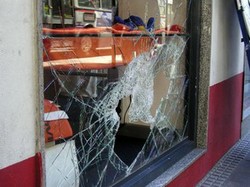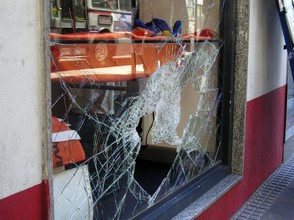
3 Tips for Home Burglary Victims
by jblack
Tips for coping with being a home burglary victim that can help make the experience a little less stressful.
Based on annual statistics compiled by the Federal Bureau of Investigation, chances are good that many reading this article have already been the victim of a home burglary or will be. Learning how to deal with a burglary before it happens can make the experience of coping with one a little less stressful.
Each day, literally thousands of Americans return home from work, school, or running errands to find that their home was burglarized in their absence. According to the "Uniform Crime Reports (UCR)," compiled annually by the FBI, in 2010, 2,025,747 burglaries were reported in the U.S. That translated to "704.9 burglaries per 100,000 inhabitants." The high incidence of home burglaries is why it is important that people educate themselves about this common property crime.
What to Do Upon Discovery of a Burglary
Sometimes a person arrives home and doesn't realize a burglary has taken place until they notice some item, such as a television, is missing. But often burglaries are discovered when a homeowner or tenant comes home to find a door ajar that they know was locked or notice obvious signs of forcible entry.
Whenever evidence exists that suggests a possible burglary, never enter the residence before calling the police. Retreat to a place of safety, ideally from where the residence can be observed, and wait for the police to arrive. While it most cases the burglar(s) will have already gone it is safer to wait and allow the police to enter first to make certain.
In those instances where the crime was not readily apparent and the residence had already been entered, nothing should be touched or moved to avoid compromising fingerprints or other physical evidence that may have been left behind by the burglar(s).
Unfortunately, the proliferation of popular crime scene investigation television programs have done an excellent job in educating criminals on how to avoid leaving behind evidence that might aid authorities in identifying and apprehending them. Even amateur burglars know enough to wear gloves to avoid leaving fingerprints at a burglary scene. But occasionally burglars get careless or inadvertently leave a tool or other item behind from which authorities do obtain useful evidence.
Making a Burglary Report
Once the police have searched and collected any physical evidence, a burglary report is taken. Provide the police with as much information as possible. Being as accurate as possible about things like the time and date of your departure from home before the offense and the date and time the crime was discovered are vitally important. In addition give as much complete detail about missing property as possible.
Being a burglary victim is a very traumatic experience. Having a stranger violate the sanctity and privacy of your home can produce unsettling feelings that go to the very core of a person's perceptions of safety and security. For this reason, burglary victims often only seem to notice the most prominent items of property that were taken like cash, televisions, computers, and expensive jewelry. Frequently victims have no idea when it comes to things like specific values and serial numbers for stolen property.
Wait a day or two until stressful feelings subside and emotions calm and then do a thorough inventory of the home to compile a complete and accurate list of all missing property. Go through personal files and receipts or contact retailers from which stolen items were originally purchased to get accurate valuations and serial numbers. Serial numbers alone often make the difference between whether any of the property is ever recovered and whether any suspects are identified. Once a written list of stolen property with values and serial numbers has been completed, take or mail a copy to the investigating law enforcement agency so that it can be made a part of the original report.
The old adage, "an ounce of prevention is worth a pound of cure" is very true with respect to a discussion of residential burglaries. Photograph valuable property items when they acquired. Write serial numbers on the back of the photos where applicable and attach receipts. Store the information in a safe place. Not only will such information be invaluable for a police report if you suffer a burglary, it will also save a good deal of frustration when filing insurance claims.
The Aftermath
Another thing that crime scene investigation television drama accomplishes is that it often causes burglary victims to have unrealistic expectations about how successful the police will be in recovering their property and in apprehending the perpetrators. According to the Center for Problem-Oriented Policing, burglaries are successful cleared at an average rate of only "14% in the United States."
The low clearance rate is not due to police ineptitude or lack of effort. The simple fact is burglaries are very difficult crimes to solve. In the majority of cases police have no leads to follow. Law enforcement agencies have limited manpower and investigative resources. As expected, agencies devote the bulk of those finite resources to the clearance of violent crimes. Understanding ahead of time that chances are slim that your burglary will ever be successfully cleared or that any suspects will be developed and arrested will preclude a lot of unnecessary frustration.
The best that most of us can realistically expect is that we will be reimbursed under our homeowners or renters insurance policy for the financial loss sustained if we suffer a burglary. As mentioned previously, a complete, detailed, and accurate written list of all stolen property and damages along with any substantiating photographs will help with filing such claims and obtaining timely reimbursements from insurers.
Sadly, home burglaries are all too common in American society. Awareness about what to do if a burglary occurs, understanding the police report process, and knowing how to manage the aftermath can go a long ways towards minimizing the stress and trauma involved in being a property crime victim.
Sources
- Weisel, Deborah Lamm. "Burglary of Single Family Houses." Center for Problem-Oriented Policing. Web. 03 Jan. 2012.
- "Uniform Crime Reports." Federal Bureau of Investigation. 2010. Web. 03 Jan. 2012.
Learn More
 | The Burglary: The Discovery of J. Edgar Hoover's Secret FBI |
 | DEALING WITH BURGLARY AND HOME INVASION ROBBERYOnly $24.95 |
 | A Burglar's Guide to the City |
You might also like
The Duck RaceWhy did a stream full of plastic ducks today draw a crowd of hundreds of peop...
Hurricane IreneImpact Of Hurricane Irene In My Town




 Reasons to Learn Spanish as a Second Language with How to Guideon 01/13/2012
Reasons to Learn Spanish as a Second Language with How to Guideon 01/13/2012
 Women in Panties: History and Perceptionson 01/12/2012
Women in Panties: History and Perceptionson 01/12/2012
 Making Good Decisionson 01/09/2012
Making Good Decisionson 01/09/2012
 How to Plan a Great Vacation that Won't break the Bank ─ Part 2on 01/09/2012
How to Plan a Great Vacation that Won't break the Bank ─ Part 2on 01/09/2012



Comments